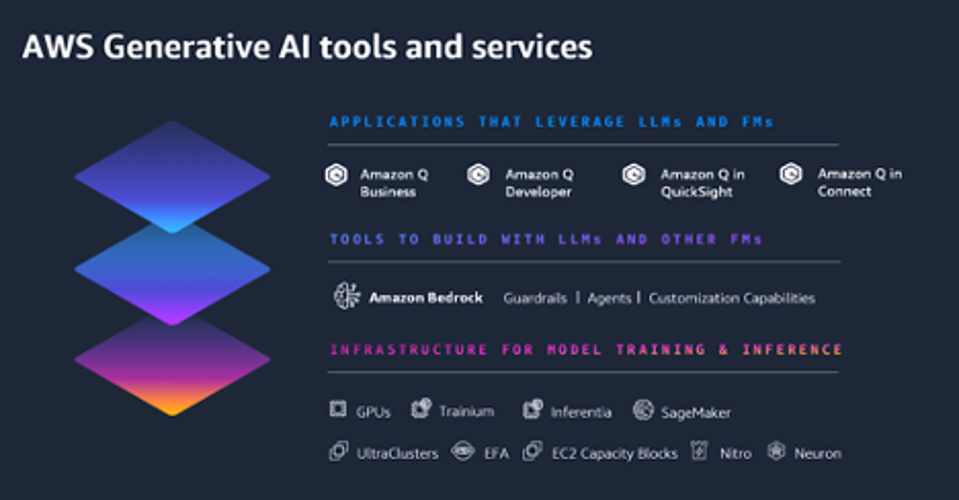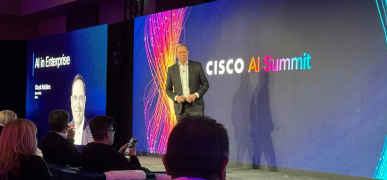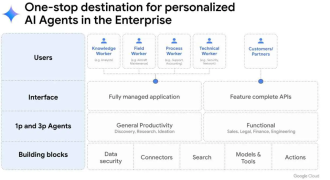
The recent AWS Summit in New York showcased AWS’s latest advancements in democratizing data and AI. The summit kicked off with a keynote by Dr. Matt Wood, vice president for AI products at AWS and a key figure at the annual AWS Reinvent conference. Wood’s keynote emphasized AWS’s commitment to making AI accessible to a broader audience through its tools and platforms. As Wood put it, thanks to these innovations, “Customers are able to apply generative AI to understand and leverage existing data in new and exciting ways.”
The AWS Generative AI Stack
The AWS GenAI stack offers a suite of tools and services for AI application development, with options suitable for both non-technical users and experienced developers. This approach aligns with AWS’s mission to lower barriers to advanced technologies and promote innovation. At the summit, AWS executives and technical experts reviewed case studies and live demonstrations, illustrating how companies of all sizes leverage the GenAI stack to address business challenges.
I particularly enjoyed hearing Brad Peterson, CTO and CIO for Nasdaq, discuss how his company leverages the stack. He emphasized the impact of cloud and AI applications for Nasdaq and its customers, highlighting that these technologies are accelerators for business innovation and growth, not just tools for efficiency. Peterson’s keynote focused on data management, AI-driven insights and automation to reduce processing times, improve financial transaction accuracy and personalize customer experiences. He concluded by saying, “This [AI] is a once-in-a-lifetime accelerator for business. Whether you’re working in product areas, a business function or both, I encourage you to find ways to improve your company with this incredible capability.”

Enhancing The Three-Layer Generative AI Stack
Since introducing its three-layer GenAI stack in 2023, AWS has continued to expand its capabilities. The stack includes a bottom layer of infrastructure, a middle layer of AI models and a top layer of applications.
- AI Infrastructure — AWS has introduced new instances powered by AI-specific chips such as its own Trainium and Inferentia processors, as well as EC2 instances powered by Nvidia H100 GPUs. This allows AWS to offer cost-effective approaches for training and running AI models. Amazon SageMaker is also an essential tool for building and deploying foundation models.
- AI Models — Amazon Bedrock, a fully managed foundation model service, offers a platform for developing and deploying generative AI applications with several new features. These include fine-tuning capabilities for models such as Anthropic’s Claude 3 Haiku, expanded data sources for RAG and improved vector search with Amazon MemoryDB, which provides the fastest vector search performance on AWS. Advanced agents now support memory retention and code interpretation, enabling more accurate and context-aware responses. New guardrails also ensure AI’s reliability and ethical use by detecting and mitigating hallucinations in model responses.
- AI Applications — Amazon Q for AI-powered applications, introduced in 2023 and made GA earlier this year, now includes Amazon Q Apps, which allows non-technical users to quickly create secure AI applications using natural-language prompts. There is also a new Amazon Q Developer feature in SageMaker Studio that enhances machine-learning workflows by providing tailored guidance, code generation and error troubleshooting. With support for more than 40 data connector options, Amazon Q helps businesses break down data silos so they can gain holistic insights. The AWS App Studio, designed for technical professionals, enables creating, deploying and managing enterprise applications with reduced development time and streamlined processes. (My colleague Jason Andersen recently wrote an interesting analysis of AWS App Studio and the lessons it holds for low-code app development.) AWS has continued to enhance AI-powered tools such as Amazon CodeWhisperer and Amazon Q to improve productivity in software development.
Democratizing Data And AI
AWS has launched initiatives to broaden access to advanced AI and data analytics for enterprises, small businesses and startups. The company has introduced several new services and features to simplify AI development, enhance data capabilities and promote responsible AI use, making these technologies more accessible to a wider range of users and organizations.
In line with AWS’s commitment to making data and AI more accessible, Amazon Q was a key focus at the summit. Amazon Q allows users to interact with data using natural language, removing the need for advanced technical skills, and provides AI-generated insights, simplifying the process of identifying trends in data. It is also cost-efficient, lowering barriers for businesses of all sizes. Perhaps most importantly in terms of broad access, its user-friendly interface promotes self-service use, enabling more people within an organization to work directly with data.
Meanwhile, AWS is promoting AI development accessibility through AWS App Studio, which, as mentioned above, allows users to quickly build AI-powered applications. SageMaker Studio was also emphasized at the summit for its role in democratizing AI development. SageMaker Studio enables a wide range of users, from individual developers to large enterprises, to efficiently build and deploy machine learning models. Additionally, its no-code and low-code features make it accessible to users without deep technical expertise.
AWS Learnings Across Industries
In addition to my role as an industry analyst, I also teach business and marketing as a professor, where I focus on using practical examples. At this year’s summit, I learned more about how AWS’s generative AI solutions are improving productivity, customer experiences and innovation across different industries. These solutions are also helping to make data and AI more accessible for businesses of all sizes. Here are some real-world examples of how these technologies are being used.
- Finance — Financial institutions are using generative AI and machine learning to create financial advice and product recommendations. For example, NatWest Group is using AWS technology to enhance the customer experience by analyzing data from 20 million customers with machine learning. This enables personalized messaging and a deeper understanding of customer needs.
- Healthcare — The Allen Institute for Brain Science is advancing brain disorder treatments by utilizing AWS AI and machine learning to synthesize research at a cellular level. Increased accessibility to AI and data tools accelerates research and the development of innovative approaches to treatment.
- Manufacturing — The e-Bike Smart Factory, revealed at Hannover Messe 2024, uses AWS IoT SiteWise and Amazon Bedrock to improve shop-floor productivity by better diagnosing and resolving equipment issues.
- Retail — Retailers are taking advantage of AWS generative AI capabilities to create personalized customer experiences, leading to better engagement and increased sales. For example, Amazon Personalize allows retailers such as Yelloh to suggest products tailored to individual customers, thereby boosting revenue growth.
- Supply Chain and Logistics — Companies are using AWS AI and machine learning across their supply chains to improve logistics and visibility, identify inventory risks and mitigate disruptions. For instance, some companies incorporate SageMaker to build forecasting models that optimize various supply-chain elements, including route management, predictive maintenance, demand planning and warehouse logistics. This allows more organizations to enhance their supply-chain efficiency and resilience using AI-driven solutions.
Deloitte’s GAI Accelerator Program with AWS
One of my favorite parts of our analyst day was a trip to Deloitte’s office in New York. Deloitte and AWS spent the afternoon showcasing their newly announced GAI Accelerator Program, whose goal is to speed up the development and deployment of GAI solutions across various industries and functions, including finance, healthcare and supply chain management. The program’s centerpiece is the Innovation Lab, where Deloitte and AWS collaborate on building industry-specific solutions and exploring new uses of technologies including AI, machine learning and robotics.
This lab aims to combine data, analytics and AI/ML capabilities with business intelligence to help clients harness the potential of generative AI. The partnership pairs Deloitte’s industry expertise with AWS technologies, including SageMaker, Bedrock and Amazon Q as described earlier, as well as Amazon Braket for exploring quantum computing capabilities.
Deloitte and AWS are aligned with Deloitte’s IndustryAdvantage initiative, a strategic $2 billion investment to co-innovate and transition successful proofs of concept into production. The program targets multiple sectors. For example, in healthcare it aims to improve patient care by enabling doctors to access years of patient information regardless of data format. For automotive manufacturers, the program focuses on AI-driven production and supply chain management improvements, using ERP and SCM data to create visual modeling that allows manufacturers to adapt more quickly to disruptions in supply or shifts in market demand.
Making AI Useful For More Organizations
AWS’s approach to democratizing data and AI is commendable. Its comprehensive GenAI stack for both non-technical users and experienced developers lowers the barriers for technology adoption, promoting innovation in organizations of all sizes across various sectors.
The AWS Summit 2024 showcased this commitment through advancements in AI infrastructure, models and applications. The introduction of tools such as Amazon Q Apps and enhancements to Amazon SageMaker, combined with responsible AI governance, highlight AWS’s dedication to making AI accessible and secure. Meanwhile, partnerships such as Deloitte’s GAI Accelerator Program accelerate AI solution development and deployment across industries. Overall, AWS seems to be living up to its intention of helping businesses transform by using scalable, secure and user-friendly AI solutions.























































































